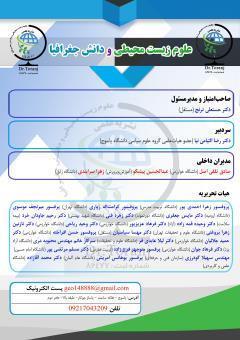بررسی توسعه ابزار مفهومی برای آموزش تربیت دینی در دانش آموزان
محورهای موضوعی : علوم دینی
1 -
کلید واژه: تحقیق مبتنی بر طراحی, خواندن انضباطی, نظریه موقعیتیابی, مطالعات دینی و اعتقادی,
چکیده مقاله :
توانایی دانش آموزان برای یادگیری در تربیت دینی به توانایی آنها در درک منابعی مانند کتابهای درسی، متون مقدس، تصاویر و سایر اشکال گفتمان بستگی دارد؛ بنابراین معلمان تربیت دینی به ابزارهای عملی برای ادغام خواندن و یادگیری نیاز دارند. این مطالعه به بررسی این موضوع میپردازد که چگونه یک ابزار مفهومی طراحیشده برای معلمان تربیت دینی برای استفاده در فعالیتهای یادگیری مبتنی بر متن، میتواند آگاهی از موقعیتیابی دانشآموز را افزایش دهد و دانش محتوای موضوعی را در تربیت دینی افزایش دهد. چهار کلاس متوسطه اول نروژی و معلمان تربیت دینی آنها در یک پروژه متمرکز بر خواندن در تربیت دینی شرکت کردند. با استفاده از یک رویکرد مبتنی بر طراحی، توسعه و استفاده از یک ابزار مفهومی (آموزش دینی) طراحیشده برای افزایش آگاهی از موقعیتیابی در تربیت دینی را توصیف میکنیم. این ابزار بر رویکرد معلمان به متون تأثیر گذاشت. دانش آموزان افزایش ارتباط موضوع درک شده، افزایش دانش انضباطی و درک بالاتر از احترام و مدارا را گزارش کردند. این ابزار میتواند از معلمان در توسعه راهبردهایی برای تدریس فراگیر در تربیت دینی پشتیبانی کند.
Students' ability to learn in religious education depends on their ability to understand sources such as textbooks, scriptures, images, and other forms of discourse; Therefore, religious education teachers need practical tools to integrate reading and learning. This study examines how a conceptual tool designed for religious education teachers to use in text-based learning activities can increase student positioning awareness and increase subject content knowledge in religious education. Four Norwegian upper secondary classes and their religious education teachers participated in a project focused on reading in religious education. Using a design-based approach, we describe the development and use of a conceptual tool (religious education) designed to increase awareness of positioning in religious education. This tool influenced teachers' approach to texts. Students reported increased perceived subject relevance, increased disciplinary knowledge, and higher perceptions of respect and tolerance. This tool can support teachers in developing strategies for inclusive teaching in religious education.
J. van den Akker, K. Gravemeijer, S. McKenney, N. Nieveen (Eds.), Educational design research, Routledge, London (2006)
T. Anderson, J. Shattuck Design-based research: A decade of progress in education research?
Educational Researcher, 41 (1) (2012), pp. 16-25, 10.3102/0013189x11428813
C. Bakker, I. ter Avest Coming out religiously: Life orientation in public schools Religious Education, 109 (4) (2014), pp. 407-423, 10.1080/00344087.2014.924774
B.A. Bradley, D. Reinking Enhancing research and practice in early childhood through formative and design experiments
Early Child Development and Care, 181 (3) (2011), pp. 305-319, 10.1080/03004430903357894
O.M.H. Bråten Towards a methodology for comparative studies in religious education. A study of England and Norway Münster: Waxmann (2013)
O.M.H. Bråten New social patterns: Old structures? How the countries of Western Europe deal with religious plurality in education
M. Rothgangel, R. Jackson, M. Jäggle (Eds.), Religious education at schools in Europe. Part 2: Western Europe, Vienna University Press/V&R unipress, Göttingen (2014), pp. 287-313
J. Ristiniemi, G. Skeie, K. Sporre (Eds.), Challenging Life: Existensial questions as a resource for education, Waxmann, Münster (2018), pp. 157-175
P. Cobb, J. Confrey, A. diSessa, R. Lehrer, L. Schauble Design experiments in educational research Educational Researcher, 32 (1) (2003), pp. 9-13, 10.3102/0013189x032001009
B. Davies, R. Harré Positioning: The discursive production of selves Journal for the Theory of Social Behaviour, 20 (1) (1990), pp. 43-63, 10.1111/j.1468-5914.1990.tb00174.x
R. Harré, L. Van Langenhove (Eds.), Positioning theory, Blackwell Publishers, Oxford (1999),
pp. 32-52View in Scopus Google Scholar
H.K. Sødal (Ed.), Religions- og livssynsdidaktikk. En innføring (2001), pp. 127-147
(Kristiansand S: Høyskoleforlaget)
L.G. Eidhamar Innenfra eller utenfra, faglig eller personlig? Perspektiver i religions- og livssynsundervisningen belyst ut fra internasjonal debatt Prismet, 70 (1) (2019), pp. 27-46, 10.5617/pri.6855
J. Everington ‘Being professional’: RE teachers' understandings of professionalism 1997–2014 British Journal of Religious Education, 38 (2) (2016), pp. 177-188,
J. Everington, I. ter Avest, C. Bakker, A. van der Want European religious education teachers' perceptions of and responses to classroom diversity and their relationship to personal and professional biographies British Journal of Religious Education, 33 (2) (2011), pp. 241-256,
N. Fairclough. Discourse and social change (reprinted) Polity press, Cambridge (2009)
Google Scholar
N.P.M. Fancourt. Re-defining ‘learning about religion’ and ‘learning from religion’: A study of policy change British Journal of Religious Education, 37 (2) (2015), pp. 122-137,
K.K. Flensner. Secularized and multi-religious classroom practice-discourses and interactions Education Sciences, 8 (3) (2018), p. 116
L. Franken. Coping with diversity in religious education: An overview. Journal of Beliefs and Values, 38 (1) (2017), pp. 105-120, 10.1080/13617672.2016.1270504
L. Franken, P. Loobuyck. Neutrality and impartiality in RE: An impossible aim? British Journal of Religious Education, 39 (1) (2017), pp. 1-6, 10.1080/01416200.2016.1218219
G. Freathy, R. Freathy, J. Doney, K. Walshe, G. Teece.The RE-searchers: A new approach to religious education in primary schools University of Exeter, Exeter (2015)
R. Freathy, H.C. John. Religious Education, Big Ideas and the study of religion(s) and worldview(s) British Journal of Religious Education, 41 (1) (2019), pp. 27-40,
J.P. Gee, J.L. Green. Chapter 4: Discourse analysis, learning, and social practice: A methodological study Review of Research in Education, 23 (1) (1998), pp. 119-169,
R. Harré. Positioning theory: Moral dimensions of social-cultural psychology J. Valsiner (Ed.), The oxford handbook of culture and psychology, Oxford University Press, New York (2012), pp. 191-206
R. Harré, L. Van Langenhove (Eds.), Positioning theory, Blackwell Publishers, Oxford (1999)
K.M. Hartvigsen, K. Tørresen. Beyond the bullet points: Teaching the bible in Norwegian upper secondary religious education. Religious Education (2019), pp. 1-13,
J. Herrington, S. McKenney, T. Reeves, R. Oliver. Design-based research and doctoral students: Guidelines for preparing a dissertation proposal (2007)
C. Holmqvist Lidh


